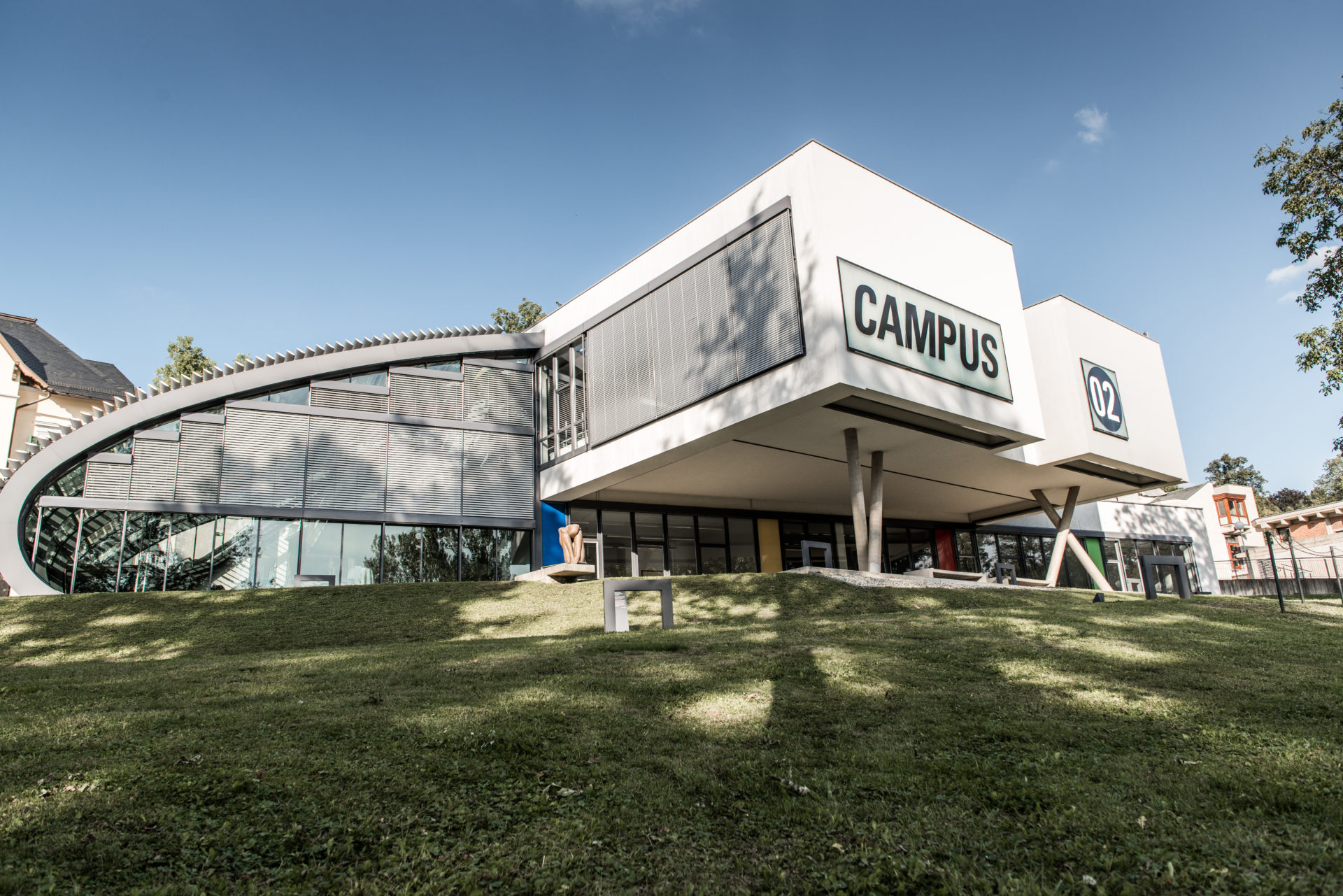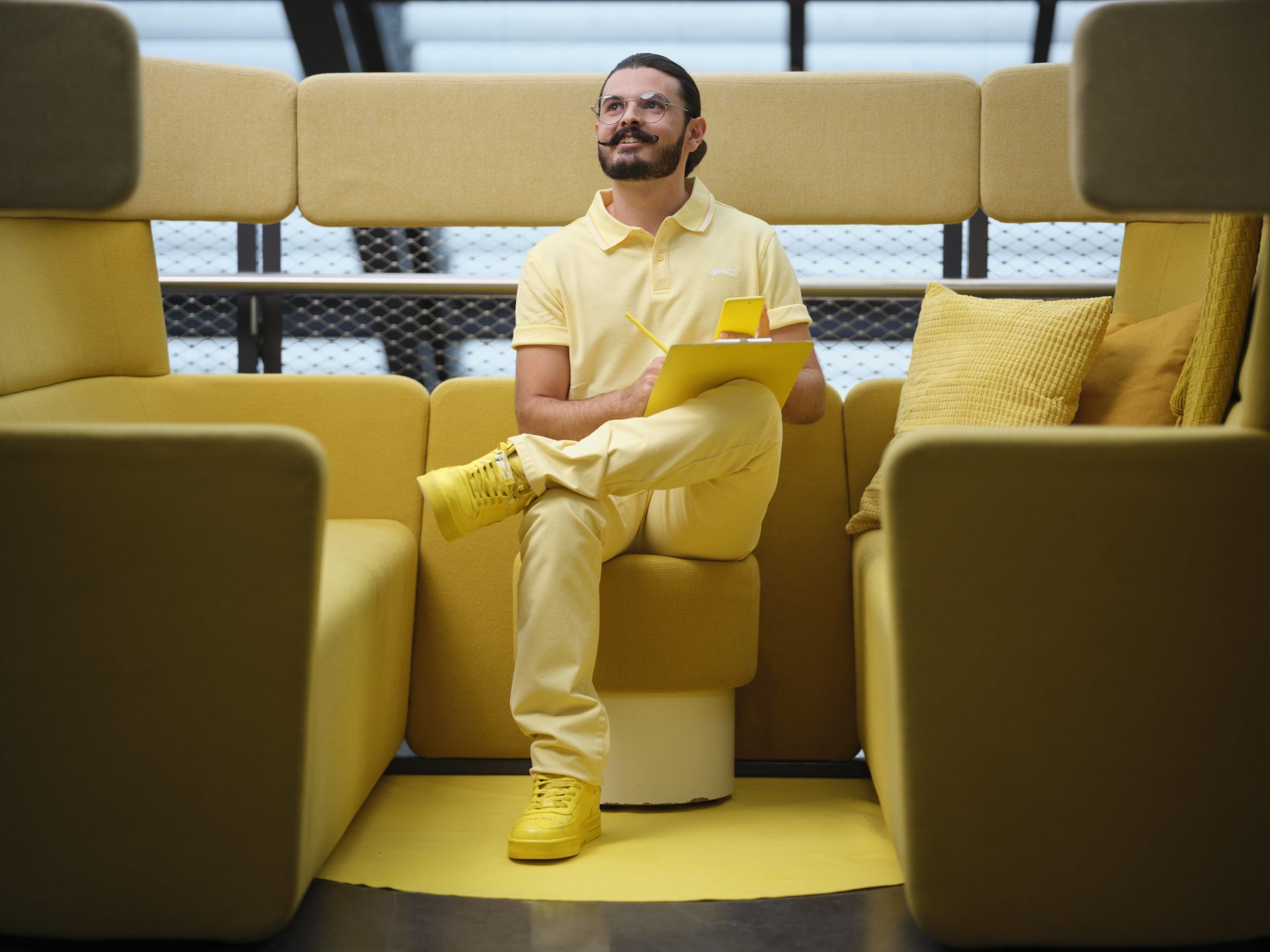
The Infopoint in the auditorium is the central point of contact for students, lecturers, staff and visitors.
If you have any questions, problems or uncertainties, the Infopoint team will endeavour to deal with your concerns as best they can. As an information interface, the Infopoint forwards information and takes care of the staff's mail. Forgotten items are also deposited here and returned to their owners. People with disabilities can also find the support they need here. Whatever the issue, this is the right place for you!

Bei uns sind Sie richtig, wenn Sie
CAMPUS 02 UAS offers numerous infrastructural and personal support options for people with disabilities and chronic illnesses. The Infopoint staff will support you if you need help in this regard.
You can find further information here Accessibility & infrastructure.
If something gets lost, such as items of clothing, USB sticks or teaching materials, we will be happy to store these items with us for 6 months.
Our premises, such as the assembly hall or lecture theatres, can be used for various events. For detailed event planning kontaktieren Sie uns bitte!
First aid kit and defibrillator are available at the Infopoint. If you need rescue, give us a call!
Austria compares favourably with other countries in the OECD's Better Life Index (2016) in terms of quality of life. Austria's scores are above average in the areas of work and income, subjective well-being, safety, social relationships, environment and education. In Austria, 81.2% say they feel safe, which is higher than the OECD average of 68.3%. Read more.
In order to maintain this feeling of safety, we would like to inform you about the following safety instructions and emergency numbers.
Emergency numbers - save them in your mobile phone!
Also see: Federal Ministry of the Interior
Polizei.AT
Polizei.AT is Austria's official police app. In addition to the latest news, prevention tips and emergency numbers, the app offers helpful information from the police sector. The app is compatible with all common operating systems (ios, android and windows) and can be downloaded free of charge from the app stores:
http://www.bmi.gv.at/cms/bmi/sicherheitsapp/
The virtual companion- Komm Gut Heim app
Let friends and family accompany you in real time. Ensure greater safety and react quickly in an emergency. Your location is only shared with selected contacts. They will be notified by push message when you set off and as soon as you arrive safely. Available free of charge for your smartphone: http://www.kommgutheim.eu/
Ever newer developments and the associated even more convenient usage options make the mobile phone a sought-after prey for thieves.
Suggestions:
In case of theft:
Report it to the police immediately! The 15-digit device number (IMEI number - International Mobile Equipment Identity) is important when making a report. This number can be used to identify a mobile phone. Make a note of the IMEI number and keep it separate from the mobile phone!
Where and how can I find the IMEI number?
Have registered mobile phones blocked immediately by the network operator.
A1: +43-800-664-100
Drei: +43-660-30 30 30
T-Mobile: +43-676-2000
A ‘stalker’ in Austria is a person who persistently and continuously pursues a person over a longer period of time in a manner that is likely to unreasonably impair their lifestyle, in particular by seeking out their physical proximity (e.g. stalking), contacting them by means of telecommunications or other means of communication or via third parties (e.g. by text message or email), ordering goods or services for them using their personal data (e.g. from mail order companies) or using their personal data to induce third parties to contact them (e.g. through personal adverts).
What should you do if you become a victim of stalking?
* Vienna Provincial Police Department, and information from Günther Ebenschweiger, President of the Austrian Centre for Crime Prevention
The more attentive someone is to their surroundings, the better they can react to a (potentially) dangerous situation. In many cases, victims have a window of opportunity in which they can still take active measures themselves. People should actively use this time - which usually only lasts a few seconds - and call the emergency number ‘133’.
Get into the habit of activating your attention radar in advance and checking your surroundings. Trust your own feelings and act accordingly (possibly take a diversion, form a group when leaving the university, take special care of your valuables, etc.). Familiarise yourself with emergency call facilities and memorise them in the speed dial button on your phone. A firm ‘NO’, vigorously turning away an uninvited visitor or a loud cry for help can prevent a criminal offence.
* Vienna Provincial Police Department, and information from Günther Ebenschweiger, President of the Austrian Centre for Crime Prevention
Take a little piece of CAMPUS 02 UAS home with you!
All articles are available at the Infopoint.
Line 39 ends directly in front of the WKO.
Line 62 stops directly at the WKO premises at the north-east parking lot and line 41 also has a stop directly in Grabenstraße or Bergmanngasse in the WIFI area.
Exit the A2 at Graz Ost: Follow the Liebenauer Tangente to the Stadion crossing. Turn right into Münzgrabenstraße and follow this until you reach Glacisstraße. Then follow Glacisstraße and Bergmanngasse/B67 to Lindweg. Turn right onto Lindweg, at the end of the road turn left into Körblergasse.
Exit the A9 at Graz Nord: Follow the road until the first traffic lights at Shopping Nord. Turn left into Wiener Straße, turn right into Weinzöttlstraße, follow Weinzöttlstraße and Grabenstraße to Lindweg, turn left onto Lindweg, at the end of the street turn left into Körblergasse.
Parking is subject to a charge in the entire area around CAMPUS 02 University of Applied Sciences, the Styrian Chamber of Commerce, WIFI Styria and the Social Insurance for Trade and Industry (SVA). The parking service is located to the left of the WIFI car park in the grey containers (see Location plan).
If you have any questions, please contact the parking service .
Follow Hochsteingasse and turn into Zusertalgasse to get to the main entrance of CAMPUS 02.


